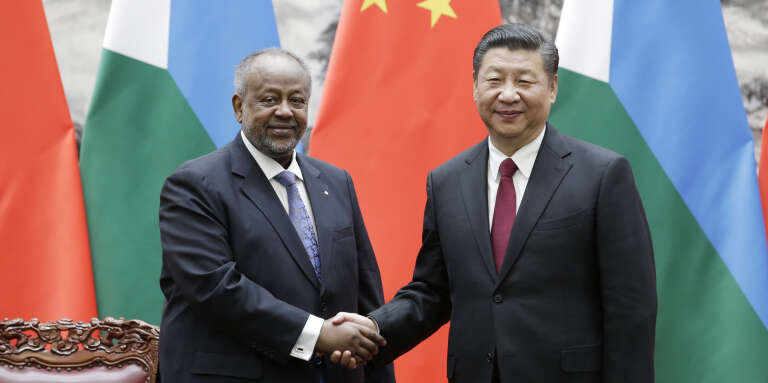Chronic. In November 2017, Djibouti President Ismaïl Omar Guelleh was received in Beijing with great fanfare by the Chinese president. But behind the official statements and the signing of a "strategic partnership" , Xi Jinping also recalled that the Chinese investments in Djibouti were a source of concern for his government.
The Djiboutian president may praise in length speech the privileged relationship he has forged with China , the reality of the ground is quite different. Administrative delays, mess politics , corruption at all levels, without counting the neighboring crisis in Yemen , the Sudan and Somalia ... The area is not easy to make the trade, but it is vital for the transit of raw materials - and mostly oil - between Africa and China.
Canceled contracts
Is the tea towel burning? The companies Chinese who hoped to win contracts in the area began to become disillusioned . Thus, the work of the two new airports entrusted to China Civil Engineering Construction Corporation (CCECC) are questioned. That of Ali Sabieh, the second largest city in Djibouti, had two airstrips, with the capacity to handle 600,000 tonnes of cargo a year. The second was to serve the Bab Al-Mandeb Strait, a strategic area for international trade and for China.
But the two contracts signed by CCECC in January 2015 were brutally challenged. The reason for the quarrel is unclear, no one obviously wishing to comment , neither Chinese nor Djiboutian side. Electricity, transport , logistics ... Contracts are all more or less challenged one after the other, and nothing is really acquired for Chinese companies, who learn in the field the harsh reality of negotiations in an area eaten by the corruption and political conflicts.
According to Africa Intelligence, the exasperation of the Chinese reached its peak when President Ismaïl Omar Guelleh returned on his promise to leave them the monopoly of free zones in the country, thus opening the game to Indian and Emirati groups. A competition saw poorly Beijing, who thought crush all the world through its military and financial power and the famous "strategic partnership" . But the national game is much more complex.
10,000 Chinese soldiers
In January, the Chinese ambassador to Djibouti, Fu Huaquiang, presented to Ismail Omar Guelleh a message of "dissatisfaction" with the Chinese government. For its part, Djibouti annoys the haughty attitude of China, whose military are much more numerous than expected on its territory. We are talking about 10,000 soldiers in the fortress base inaugurated by Beijing in August 2017, where the exercises of the People 's Army are impressive, especially with its armor type 095 and 90 - II, the most modern ever used in Africa.
Ismaïl Omar Guelleh even expressed his dismay in Paris . During his meeting with President François Hollande just a year ago, he was openly worried about the much more massive presence of Chinese soldiers. According to the records of interviews, the Djibouti president also revealed in this head-to-head as the lease of land by the armed Chinese ed was in debt deduction contracted by Djibouti to China, which owns 60% of Djiboutian debt.
President Guelleh is playing big in this matter. If he wants to remain the darling child of the Chinese president, he will have to very quickly put a little order in the files, while Americans and French hope to calm the Chinese ardours in their garden . The American base of Camp Lemonnier is indeed a cable from the Chinese base, and never the soldiers of the two countries have been so close to each other.
Alternative solution
China has relied heavily on Djibouti and its strategic position in the Horn of Africa. In five years, Beijing has injected some 14 billion dollars (11 billion euros) into the Djiboutian economy. There was even talk of the emergence of an African Dubai, but the case could run short.
"Djibouti is just the beginning of a new era for China. It's all about protecting your business interests, says Benjamin Barton, professor of international relations at Kuala Lumpur University. Until then, China had no access to any military port in the region. A Chinese ship even remained one hundred and thirty-four days at sea for lack of port of reception. Another problem, we have seen with Libya and Yemen, the ability of China to evacuate its expats in case of war or serious crisis. Chinese defense attachés in Africa have had a hard time findinglogistical solutions to evacuate their fellow citizens. China therefore needs a permanent pied-à-terre in the region. "
But perhaps Djibouti is not the ideal plan and Beijing is already looking for an alternative. Negotiations have actively resumed with Namibia to build a second military base in Africa, in Walvis Bay. Further north, Beijing seeks to place its pieces between Egypt , Syriaand Yemen. An installation in Oman is also planned by the People's Liberation Army, but also by the Indian army, which promises to further increase tensions between the two Asian giants. Further east, there is talk of a Chinese military base in Pakistan, while another has just been confirmed in Afghanistan . A sanitary cordon, in a way, that would allow Beijing to fully secure its maritime silk routes between China and Africa.
Sébastien Le Belzic has been based in China since 2007. He heads the site Chinafrica.info , a magazine about "Chinafrique" and emerging economies.





